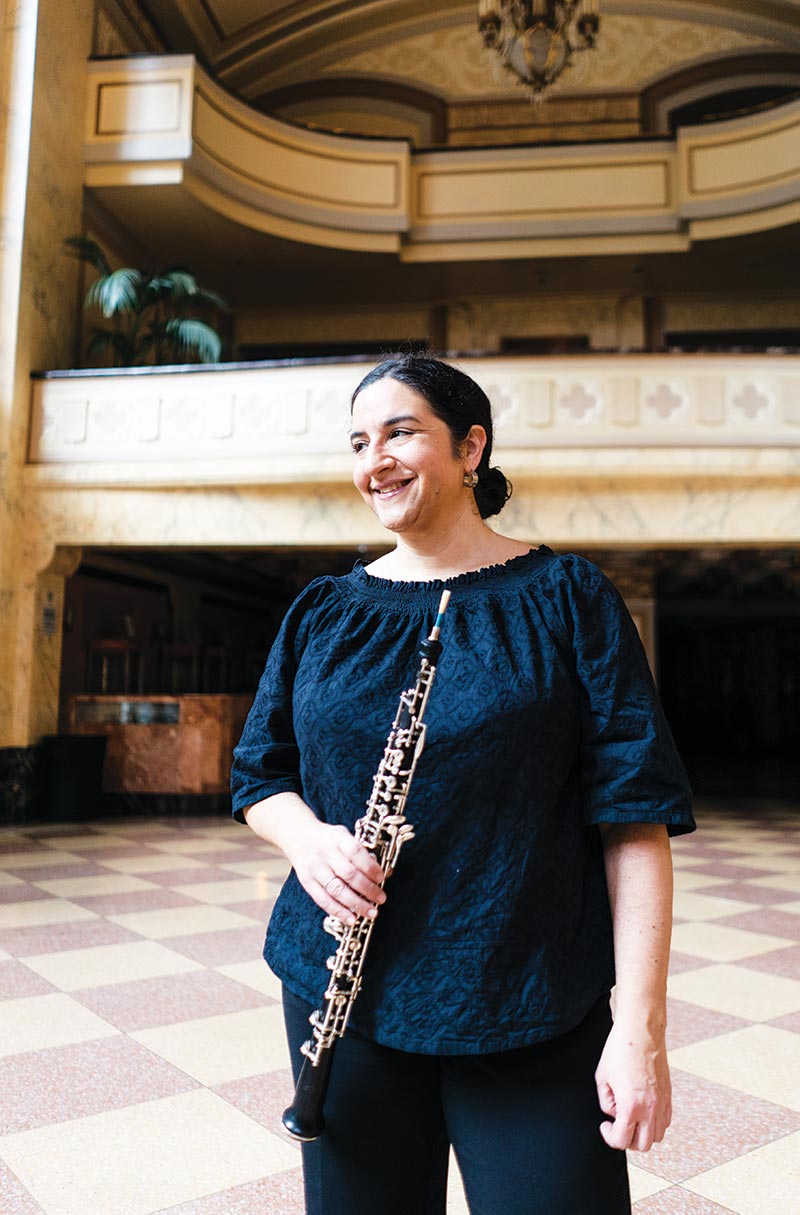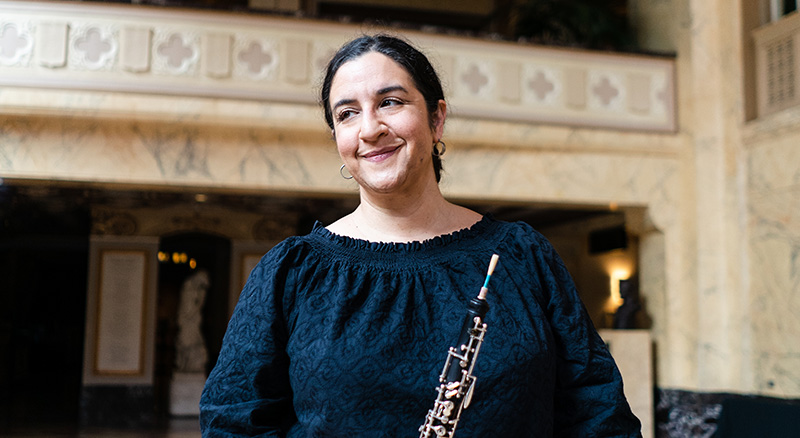K
aren Wagner, assistant principal oboe for the Oregon Symphony since 1999, could teach a masterclass on making reeds if she weren’t so busy making music and training young musicians at her private studio. She’s performed with 45th Parallel, Helios Camerata, Arcturus Quintet, Chamber Music Northwest, the Oregon Bach Festival, and the Oregon Ballet Theatre Orchestra. For the past 17 seasons, she has also served as principal oboe with the Cabrillo Festival of Contemporary Music. Her education includes a bachelor’s from the State University of New York at Buffalo and the better part of a master’s at the University of Southern California. Before joining the Oregon Symphony, she was with the Louisville Orchestra and the New World Symphony in Miami Beach.

Karen Wagner, Oregon Symphony Assistant Principal Oboe. Photo by Christine Dong, Artslandia.
What’s your first memory of a live music performance?
I’m not 100% sure when, but I am certain that it was the Buffalo Philharmonic. I was on a school field trip. I cheered like I was at a rock concert and got in trouble.
How did you come to play the oboe? Can you describe your first experience of being drawn to it?
We had a family friend whose daughter played the oboe. She was older and someone I looked up to. My mom brought me to hear her play, and I fell in love with the sound. That was it.
What draws you to working with young musicians?
Everything. I love young people and the energy they bring to everything they do. My students have brought more joy than any other part of my career. I learn more from them than they will ever know. Teaching reminds me that there is still hope for us all.
What role do you think music education plays for young people?
I have been thinking about this a lot lately. If you asked me this question a year ago, I would have touted all of the scientific research about the known and proven benefits of arts in education. I still firmly believe all of that, and the science is there. However, at this moment, I feel that it has never been more crucial for kids to have an outlet to express themselves. In the arts, individuality and difference are applauded and celebrated.
What advice do you give to aspiring professional musicians?
A career in music is not for everyone. It takes an incredible amount of desire, dedication, and hard work. If you don’t want it more than anything and aren’t willing to put in the time, it might not be the career for you (and that’s ok). It is also imperative to have a balanced life. There is time to practice, make reeds, and have a life, too. It’s all about balance. It’s much easier said than done and something I strive for in my life.
How much time do you spend practicing? Where are you most often when you practice?
It is important to remember that oboists and bassoonists spend much of their practice time outside of rehearsal making reeds. I would say, between the two, I spend anywhere from 1–3 hours a day. I have a dedicated studio in the house where I work and teach.

Karen Wagner, Oregon Symphony Assistant Principal Oboe. Photo by Christine Dong, Artslandia.
Do you notice a difference in the feeling of the room, or the way the audience engages, when playing a less traditional show?
It’s is nearly impossible to see the faces of the audience from my position on the stage at the Schnitz. Even so, I can sense when they like something or when they don’t. Our audience is pretty open to new music and less traditional experiences, and for that, I am so appreciative. I am also a member of 45th Parallel, a Portland-based collective of musicians from the OSO that generally plays in smaller venues. I always enjoy playing in a setting where I can more easily connect with the audience… or see when they’re on their phones!
Describe your ideal experience of seeing a live music performance. Where are you? Who is onstage?
My ideal live performance is seeing any musician(s) I love performing in a small venue. As far as orchestras go, I saw the Berlin Phil live in their hall in the early ’90s, and nothing has ever come close. Their Digital Concert Hall is a revelation.
Of all the places you’ve performed, what’s your favorite venue? Your favorite audience? What made it so?
I had the chance to play in the Concertgebouw [in Amsterdam] with the New World Symphony, and I will never forget that hall. But my favorite memory of hall and audience combined is when the Oregon Symphony played in Carnegie Hall. Not only did many of our patrons and fans from Portland join us in New York City, but many of my family and friends who are all on the East Coast got to hear us play there. It was magical.
The path to becoming a professional musician is not for the faint of heart. What’s the most rewarding part of your job?
It has never been more satisfying to provide a form of escape for people in an uncertain world. Providing a place for people – my colleagues and myself included – a place to literally unplug from it all.
What do you find most challenging about being a professional musician?
Performing for a living can be psychologically difficult, always waiting for the next performance. People inevitably remark to those of us in this field, “Oh, that must be so much fun.” I usually (upside-down) smile and say, “It is. It is also very hard work, and sometimes, it’s a job like any other.”
What do you do for fun and relaxation outside of music?
In my spare time, I love to take walks with my husband Dave, bake, workout, stream good TV and movies, and enjoy Portland.
